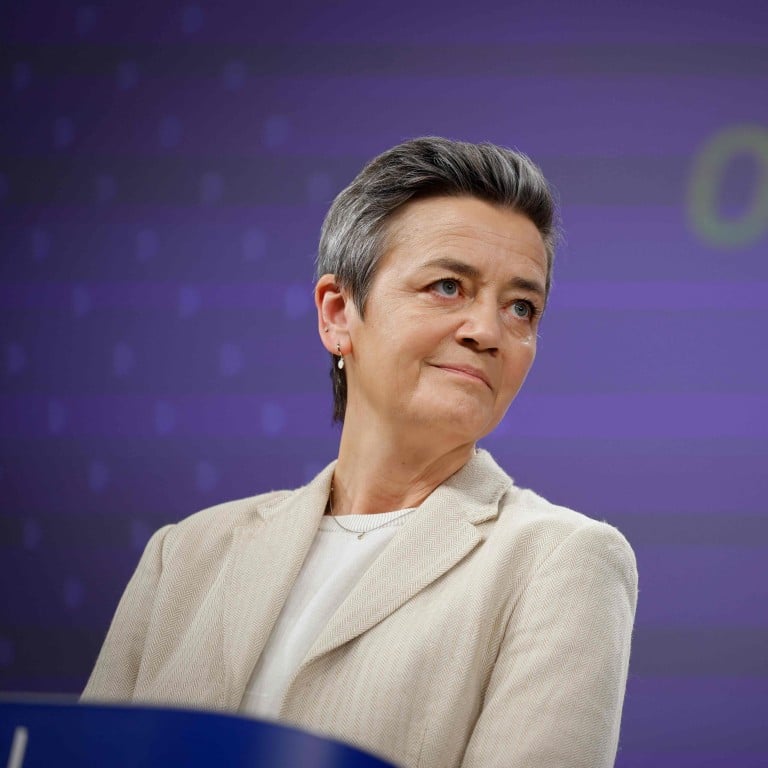
China’s wind sector latest in European cross hairs after EVs, solar panels, trains
- Ex officio probe announced by competition chief Margrethe Vestager covers ‘conditions for the development of wind parks’ in six EU nations
- ‘Our economies cannot absorb’ the impact as China doubles down on supply side support for its economy, Vestager says in speech at Princeton
The probe, announced by competition chief Margrethe Vestager in the United States on Tuesday, covers “the conditions for the development of wind parks in Spain, Greece, France, Romania and Bulgaria”.
It is the third China-facing investigation under the bloc’s foreign subsidies regulation, a tool adopted last year. The previous two accused Chinese businesses of using state subsidies to undercut the opposition in public procurement contracts.
In this case, the investigation is at a preliminary stage, and has been launched ex officio, meaning on the own volition of executive arm the European Commission, without an official complaint from member states.
The announcement came during a speech at Princeton University in which Vestager, who will leave her role after the European elections in June, pitched a tougher line on China.
Vestager also lashed out at the “playbook for how China came to dominate the solar panel industry”.
She said this involved Beijing attracting foreign investment in its solar sector through joint ventures with local partners, acquiring the technology through methods that were “not always above board”, lavishing subsidies on domestic players while “closing the domestic market to foreign businesses”, and then exporting cheap excess capacity to the rest of the world.
“We see this playbook now deployed across all clean tech areas, legacy semiconductors, and beyond – as China doubles down on a supply side support strategy, to address its economic downturn,” Vestager said.
“Our economies cannot absorb this,” she added.
“It is not only dangerous for our competitiveness. It also jeopardises our economic security. We have seen how one-sided dependencies can be used against us.”
Vestager’s intervention comes as the debate over overcapacity in the Chinese economy reaches fever pitch.
‘Something must change’: EU chamber warns of unfolding ‘train accident’ with China
Unsatisfied with what they see as a lack of response in Beijing to long-standing demands to adjust its economic policies, a series of investigations have been launched into what Brussels has described as “market distorting” state subsidies.
These have come in a variety of high profile sectors, like EVs, train carriages and solar panels, and have seen the EU tap into its range of trade weapons. Rail and solar probes were the first to be launched under its new foreign subsidies regulation.
The bloc is planning in the coming days to launch the first-ever investigation using its international procurement instrument, sources said. This will probe the lack of market access reported by European firms in China’s medical devices procurement sector.
During a meeting with Chinese car executives in Paris on Tuesday, Wang pushed back against an EU probe into state subsidies in the sector and slammed the “narrative” on overcapacity.
According to a press release from the China Chamber of Commerce to the EU, Wang “urged the European side to avoid misinterpreting standard export activities resulting from globalisation and the diverse supply chain locations as indicative of overcapacity”.
In a veiled threat at retaliation, he said: “By this reasoning many of Europe’s own advantageous products could also be subject to such labelling”.
The topic was high on the agenda when US Treasury Secretary Janet Yellen visited China earlier this week.
Yellen asked Beijing to address industrial overcapacity in sectors such as EVs and solar modules, which she warned could be a repeat of what happened when China’s below-cost steel flooded into the global market a decade ago.
“I’ve made clear that President [Joe] Biden and I will not accept that reality again,” she said during a news conference at the US ambassador’s residence in Beijing on Monday.
German Chancellor Olaf Scholz can be expected to strike a more conciliatory tone than Vestager during an imminent trip to Beijing accompanied by a small business delegation.
“There is no European consensus about the risks that China’s industrial overcapacity pose,” said Agathe Demarais, senior policy fellow at the European Council on Foreign Relations.
“This highlights diverging degrees of economic reliance on China, with Germany an outlier in Europe. German firms have a huge presence in China, where their annual revenues represent a staggering 6 per cent of German gross domestic product,” Demarais said, noting that the figure was more than double the average of Europe’s six largest economies.
A lobby group representing Chinese business interests in Europe accused the EU of abusing its new foreign subsidies regulation.
“We reiterate that the EU side’s continuous deployment of new tool against Chinese enterprises forges an act of economic coercion. This action sends a detrimental signal to the world, suggesting discrimination against Chinese enterprises and endorsing protectionism,” read a statement from the China Chamber of Commerce to the European Union.
It said that it had received complaints from Chinese businesses that during investigations under the instrument, the EU had “broadened the definition” of what constitutes subsidies, and demanded they submit “significant volume of materials within tight deadlines”.

